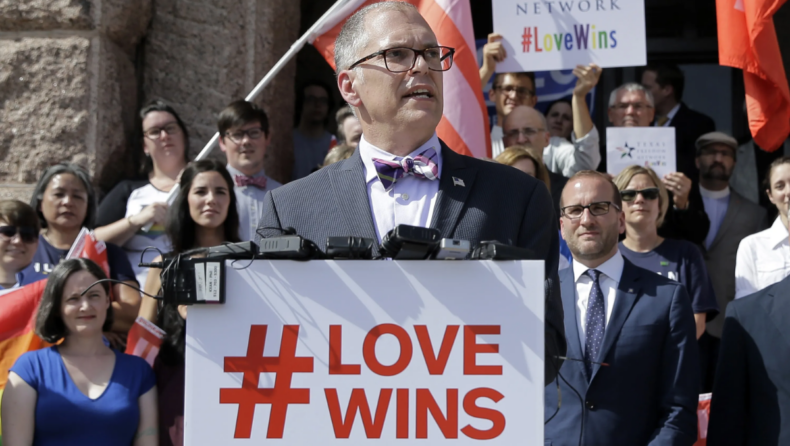In response to worries that other rights would be threatened by the Supreme Court’s decision to overturn Roe v. Wade abortion access, the US House authorised legislation to preserve same-sex marriages and interracial unions.
The U.S. House passed a bill on Tuesday, July 19, 2022, to protect same-sex and interracial marriages. This was done because many conservatives were worried that the Supreme Court’s decision to overturn Roe v. Wade could hurt other rights.

In a strong but one-sided debate, Democrats argued passionately and often personally in favour of making marriage equality a federal law, while Republicans avoided outright rejecting gay marriage. Instead, top Republicans said that the bill wasn’t needed because the country had bigger problems to deal with.
partly as a political move to get all members of the House, Republicans and Democrats alike, to go on the record. It was also a way for the legislative branch to push back against an aggressive court that has made people wonder if other U.S. laws that seemed to be settled should be looked at again.
Aides say GOP leaders didn’t push their members to stick with the party line and vote against the bill because they were afraid of the political consequences. All of the Democrats and 47 Republicans voted for it to pass.
Rep. Mondaire Jones, D-N.Y., said, “This is personal to me.” He said he was one of the openly gay members of the House.
https://twitter.com/RepMondaire/status/1549462159389868032?s=20&t=XJQHw1R9YZT4wjkj2w0pBg
“Imagine telling the next generation of Americans, my generation, that we no longer have the right to marry the person we love,” he said. “That can’t happen if Congress doesn’t stop it.”
The Senate is likely to stop working on a bill.
The Democratic majority in the House made it easy for the Respect for Marriage Act to pass. However, the Senate is evenly split, and most Republicans would likely join a filibuster to stop it. It’s one of the bills that Democrats are putting forward to challenge the court’s conservative majority. Others include bills that would make abortion legal. Later this week, a vote will be held on a bill that would make sure everyone has access to birth control.
Reps. Minority Leader Kevin McCarthy and Whip Rep. Steve Scalise voted against the marriage rights bill, but Rep. Elise Stefanik of New York, the No. 3 Republican, voted for it.
Mitch McConnell, the leader of the Republicans in the Senate, didn’t say what he thought about the bill. His silence was notable, and it left open the question of how hard his party would fight it if it came up for a vote in the upper chamber.
Key Republicans in the House have changed their minds about same-sex marriage in the past few years. One of them is Rep. Liz Cheney of Wyoming, who voted for the bill on Tuesday.
Rep. Nancy Mace of South Carolina, who voted yes, said, “If gay couples want to be as happy or unhappy in marriage as straight couples, that’s their choice.”
Polls show that most Americans want to keep the right to marry, regardless of sex, gender, race, or ethnicity. This is part of a long-term shift in modern attitudes toward being open to everyone.
There is a lot of support for same-sex and mixed-race marriages.
A Gallup poll showed that more and more people are in favour of same-sex marriage. Seventy percent of American adults said they think these marriages should be legal. Both Democrats (83%) and Republicans (57%) agreed with the majority in the poll (55.5 percent).
Gallup says that 94 percent of Americans approved of mixed-race marriages in September, which was the highest number in the last 60 years.
Before Tuesday’s vote, a number of lawmakers joined protesters outside the Supreme Court, which is across from the Capitol and is fenced off for safety during tense political times. They were upset about the court’s decision on abortion. Capitol Police said that 16 people in Congress were among those who were arrested.
Rep. Mary Gay Scanlon, D-Pa., said in an opening speech for Tuesday’s debate, “The extreme right-wing majority on the Supreme Court has put our country on a dangerous path.”
https://twitter.com/RepMGS/status/1549530435700592641?s=20&t=XJQHw1R9YZT4wjkj2w0pBg
“Our friends on the other side of the aisle need to stand up and be counted.” Will they vote to keep these basic rights safe? Or will they vote to let the states take away these rights? “
But Republicans said that the court’s June decision to overturn Roe v. Wade, which had been in place for almost 50 years, was only about abortion access. They also said that same-sex marriage and other rights were not in danger.
In fact, almost none of the Republicans who spoke during the debate brought up same-sex marriage or marriages between people of different races.
Rep. Jim Jordan of Ohio, the top Republican on the Judiciary Committee, said, “We are here for a political show. We are here to send a political message.”
You could expect the Senate to take the same tack.
Sen. Josh Hawley, a Republican from Missouri, said, “This is based on the wrong idea.” I don’t think any of that will be overturned by the Supreme Court. “
Several Democrats talked about how they or their loved ones had been treated unfairly in same-sex marriages. The Republicans, on the other hand, talked about rising gas prices, inflation, and crime, including recent threats to justices over the abortion ruling.
For Republicans in Congress, Trump’s confirmation of conservative justices to the Supreme Court has fulfilled a long-term goal of going back to many social, environmental, and regulatory issues that the party hasn’t been able to deal with on its own by passing bills that could be signed into law.
The Respect for Marriage Act would get rid of a law from the Clinton administration that says marriage is between a man and a woman and it can’t be with anyone else. It would also protect interracial marriages in the law by making it illegal for any state to deny out-of-state marriage licences and benefits based on a person’s race, ethnicity, national origin, or sex.
The Defense of Marriage Act from 1996 was mostly forgotten because of court decisions made during the Obama administration. For example, Obergefell v. Hodges, a landmark case for gay rights, said that same-sex couples could marry anywhere in the country.
But last month, Justice Samuel Alito, writing for the majority that overturned Roe v. Wade, argued for a narrower view of the rights guaranteed to Americans. He pointed out that the right to an abortion was not written into the constitution.
In a separate opinion, Justice Clarence Thomas said that other decisions that are similar to Roe should also be looked at. These include decisions about same-sex marriage and the right of couples to use birth control.
But others have taken notice. But others have taken notice. Alito said in the majority opinion that “this decision concerns the constitutional right to abortion and no other right,” but others have taken notice.
https://twitter.com/SenSchumer/status/1549792216788467713?s=20&t=XJQHw1R9YZT4wjkj2w0pBg
Senate Majority Leader Chuck Schumer, D-N.Y., said of Trump’s supporters, “The MAGA radicals who are taking over the Republican Party have made it clear that getting rid of Roe is not enough for them.”
Sen. Ted Cruz, R-Texas, said over the weekend that the Supreme Court’s decision to protect marriage equality was “clearly wrong” and that state legislatures should look into the issue.
But Mr. Schumer did not promise to put the marriage bill up for a vote.
Current Country Situation Regarding Marriage Equality
Currently, same-sex marriage is legal in 32 countries: Argentina, Australia, Austria, Belgium, Brazil, Canada, Chile, Colombia, Costa Rica, Denmark, Ecuador, Finland, France, Germany, Iceland, Ireland, Luxembourg, Malta, Mexico, the Netherlands, New Zealand, Norway, Portugal, Slovenia, South Africa, Spain, Sweden, Switzerland, Taiwan, the United States of America, the United Kingdom, and Uruguay.
22 nations have legitimised same-sex marriage on a national level. Australia, Ireland, and Switzerland were the only nations to legalise same-sex marriage by law after nationwide elections.
The United States of America, Austria, Brazil, Colombia, Costa Rica, Ecuador, Mexico, Slovenia, South Africa, and Taiwan have all allowed same-sex marriage by court judgments.
Two nations, South Africa and Taiwan, passed laws allowing same-sex marriage in response to court orders.













